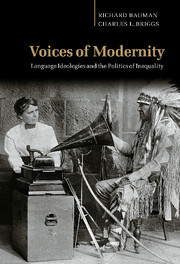Book contents
- Frontmatter
- Contents
- Preface
- 1 Introduction
- 2 Making language and making it safe for science and society: from Francis Bacon to John Locke
- 3 Creating modernity's others in seventeenth- and eighteenth-century England: antiquarian and philological inflections
- 4 The critical foundations of national epic and the rhetoric of authenticity: Hugh Blair and the Ossian controversy
- 5 Language, poetry, and Volk in eighteenth-century Germany: Johann Gottfried Herder's construction of tradition
- 6 Scientizing textual production in the service of the nation: the Brothers Grimm and Germanic philology
- 7 The making of an American textual tradition: Henry Rowe Schoolcraft's Indian researches
- 8 The foundation of all future researches: Franz Boas's cosmopolitan charter for anthropology
- 9 Conclusion
- References
- Index
5 - Language, poetry, and Volk in eighteenth-century Germany: Johann Gottfried Herder's construction of tradition
Published online by Cambridge University Press: 22 September 2009
- Frontmatter
- Contents
- Preface
- 1 Introduction
- 2 Making language and making it safe for science and society: from Francis Bacon to John Locke
- 3 Creating modernity's others in seventeenth- and eighteenth-century England: antiquarian and philological inflections
- 4 The critical foundations of national epic and the rhetoric of authenticity: Hugh Blair and the Ossian controversy
- 5 Language, poetry, and Volk in eighteenth-century Germany: Johann Gottfried Herder's construction of tradition
- 6 Scientizing textual production in the service of the nation: the Brothers Grimm and Germanic philology
- 7 The making of an American textual tradition: Henry Rowe Schoolcraft's Indian researches
- 8 The foundation of all future researches: Franz Boas's cosmopolitan charter for anthropology
- 9 Conclusion
- References
- Index
Summary
In his most comprehensive treatise on the relationship of poetry to culture in the course of human history, the great German philosopher, Johann Gottfried Herder (1744–1803), pays tribute to those scholars of ancient poetry who most inspired his own work: “especially and above all, I want to cite only Blackwell's Enquiry into the Life and Writings of Homer …, Wood's Essay on the Original Genius and Writings of Homer …, Blair's Critical Dissertation on the Poems of Ossian” (SW 8: 341n.). The writings of these critical precursors, and Lowth as well, with whom Herder was also closely familiar, had a profound shaping influence on Herder's thought: his understanding of the radical interrelationship of language, poetry, and history, his conception of oral tradition as the touchstone of cultural continuity, his valorization of immediacy and presence in performance, and his recognition of the affecting power of significant form. Herder's debt to the British philological tradition will be clear in the pages that follow, but it was his own great intellectual achievement to render the ideas of his forebears into a metadiscursively founded theory of culture, society, and history, a magisterial synthesis that has served as one of the cornerstones of the project of modernity for the past two hundred years. Building upon Blair's recognition of oral transmission as the engine of textual continuity between ancient bardic song and contemporary oral poetry in the formation of national epic, Herder created a conception of tradition as constitutive of vernacular literature and national identity.
- Type
- Chapter
- Information
- Voices of ModernityLanguage Ideologies and the Politics of Inequality, pp. 163 - 196Publisher: Cambridge University PressPrint publication year: 2003
- 3
- Cited by



